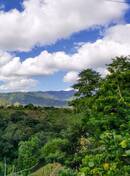Nouvelles
The Sound of the Forest: Community forest management and the legal timber trade in Colombia
24/03/2021
24/03/2021

Through its national REDD+ strategy, Colombia has been working to protect its forest resources since 2018. The country’s Forest Management and Deforestation Control Strategy “Bosques territorios de Vida” (Forests - territories of life)is an important step for the country, as it works towards fulfilling its commitments under the Paris Agreement. Improved forest governance is at the centre of Colombia’s efforts to halt deforestation and forest degradation, as is actions to achieve Nationally Determined Contributions and the Sustainable Development Goals (SDGs).
The Food and Agriculture Organization of the United Nations (FAO) has been supporting the Colombian government in the implementation of various...

Over the last decade, many countries have come to recognise forests as assets that require up-to-date data to monitor status and changes over time. Nowadays, forest data has become an indispensable foundation for informed decision-making on a wide range of issues, including reporting on climate and REDD+ commitments.
Driven by this awareness, forested countries have made significant progress in developing and operationalising their National Forest Monitoring Systems (NFMS). Guided by the UNFCCC, the work to set up robust and sustainable NFMS has been advanced through capacity development and South-South cooperation. In addition, efforts have been made to institutionalise NFMS in order...

Autoridades nacionales y funcionarios FAO participaron en el taller de inicio del proyecto: Fortalecer capacidades institucionales y técnicas en los sectores agropecuario y forestal de Nicaragua para responder a los requerimientos del marco de transparencia reforzado bajo el Acuerdo de París (CBIT Nicaragua).
Este proyecto permitirá al país avanzar en el abordaje de sus compromisos en materia climática mediante el fortalecimiento de las capacidades de las instituciones para realizar de mejor manera el reporte de los avances nacionales, de acuerdo a las disposiciones establecidas en el artículo 13 del Acuerdo de Paris, en armonía con el Programa Nacional de Desarrollo Humano...

Forests play an essential role in climate change mitigation, with strong momentum for Nature-based Solutions (NBS). Recognizing that reducing fossil fuel emissions remains the top priority, increased attention is given to initiatives like REDD+ to contribute to climate change mitigation. This is illustrated by the recentapproval of ART-TREES, a new REDD+ standard for quantifying, monitoring, reporting and verifying emission reductions at scale that will help the international aviation industry achieve carbon-neutral growth after 2020 and help private sector offsetting.
For more than a decade, the UN-REDD Programme has supported countries in preparing for REDD+. To date, 54 countries have submitted a...

The collective land claims of indigenous peoples and local communities cover more than half the global landmass, including some of the most important and biodiverse forest areas in the developing world. Recognising and securing these collective tenure rights would make a substantial contribution to reducing deforestation and forest degradation. Secure tenure systems have also been recognised for leading to transformational changes in the landscape for long-term climate change mitigation and to activities that enhance sustainable development.
There are multiple reasons for governments and institutions to prioritise collective tenure rights while moving forward with their REDD+ actions:
Secure collective tenure rights strongly...

